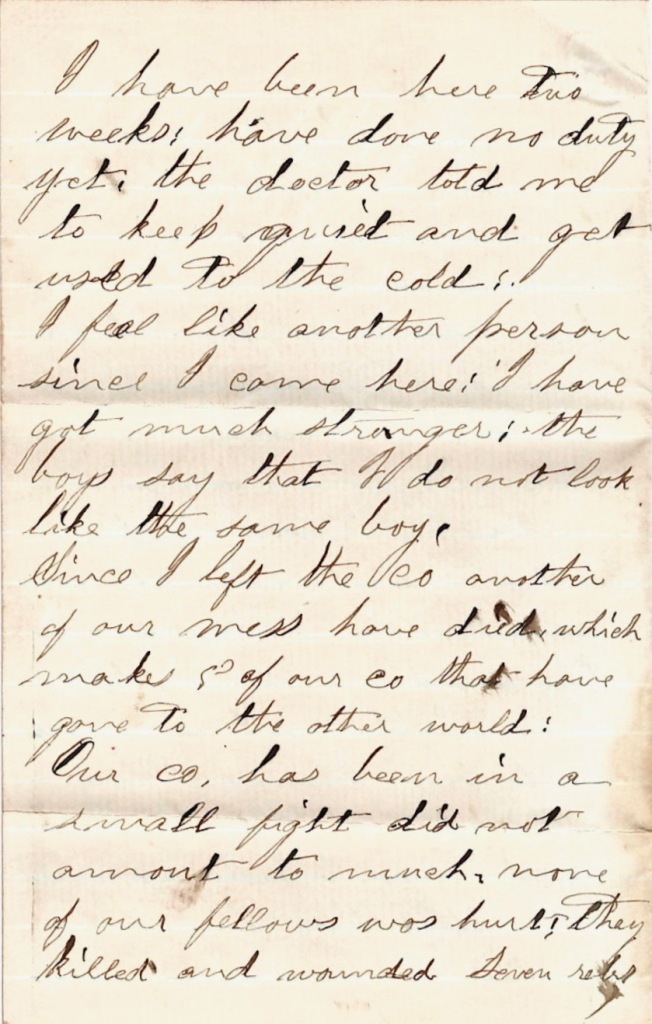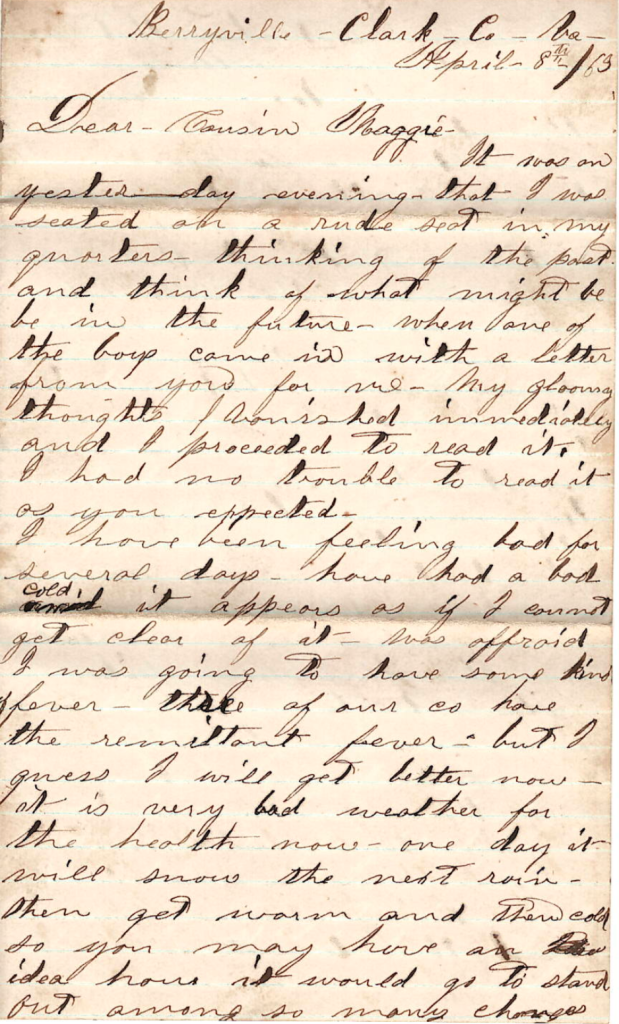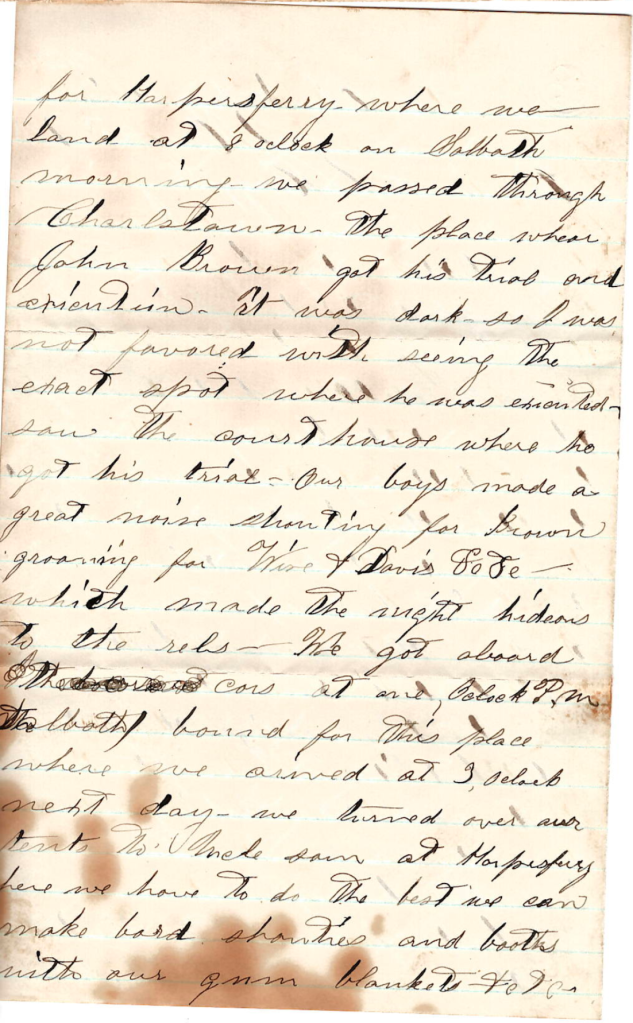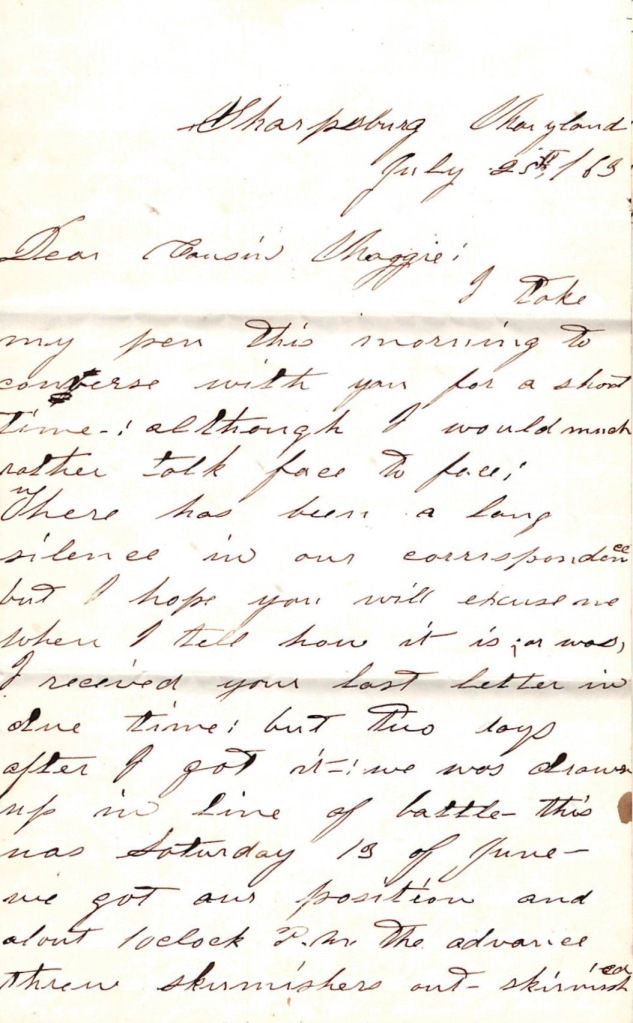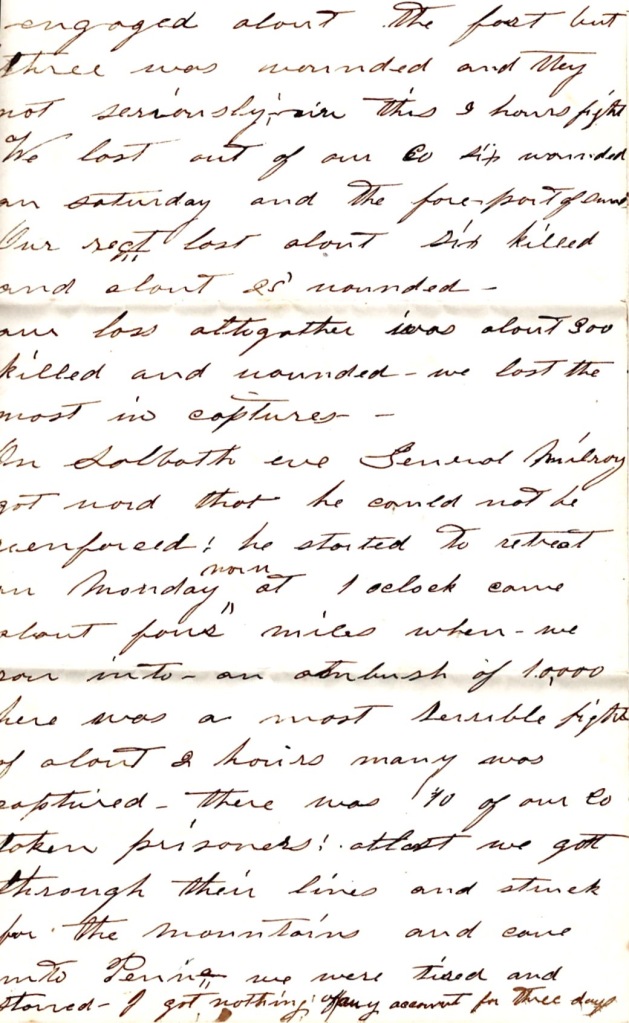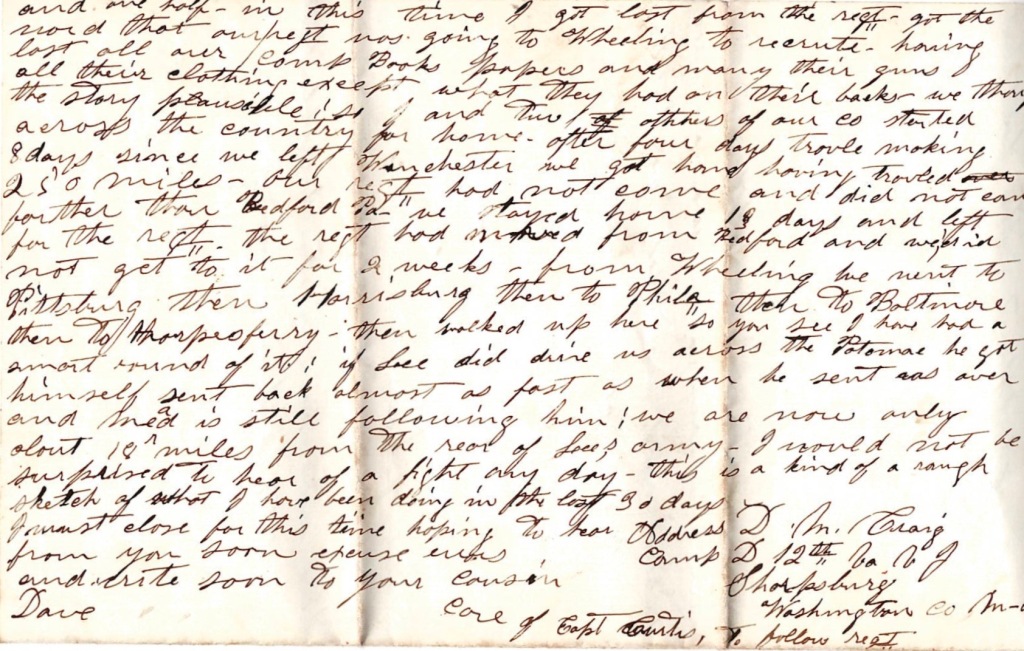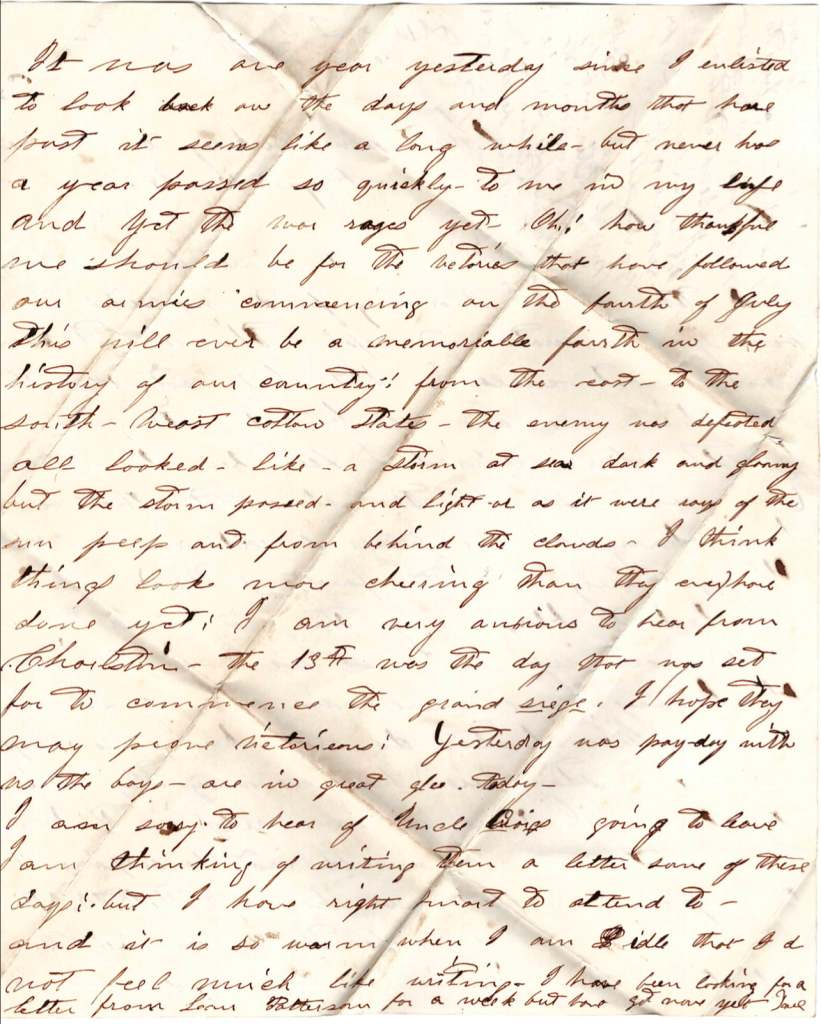
These letters were written by David Milo Craig (1840-1863) of Co. D, 12th West Virginia, Infantry. David enlisted as a private on 14 August 1862 at West Liberty, Virginia, when he was 22 years old. According to his military records, David did not survive the war. He died of diphtheria at Martinsburg, West Virginia on 22 August 1863—only one week after stating that he was “blessed with good health” in the final letter of this collection.
The death of their eldest son must have been a punishing blow to his parents, William Craig (1816-1902) and Rachel Patterson (1813-1891) of West Liberty, Ohio County, Virginia (now West Virginia). They had seen their son recently when he returned home (without leave) following the Battle of 2nd Winchester. In the weeks following this visit, David’s parents claimed that he had been “in better spirits and more hopeful that he would survive this ‘cruel war,’ …but he seemed dated to ailment, yet seldom complaining, longing most to do his duty where danger was nearest or hardships most to be dreaded.” Tucked away in his memorandum book, sent home to his family, his parents found the following hymn which read:
“I’m a lonely traveler here, weary, oppressed,
But my journey’s end is near, soon I shall rest.
Dark and dreary is the way, tolling I’ve come,
Ask me not with you to stay, yonder’s my home.”
David wrote all six letters to his cousin, Margaret (“Maggie”) Janes Stewart of St. Clairsville, Belmont County, Ohio. Maggie was the daughter of John Stewart (1806-1892) and Anne Bell Patton (1813-1892).
David’s letters span the period from February to August 1863 and includes an account (Letter 5) of the Battle of 2nd Winchester (June 1863) in which Confederate General Richard S. Ewell’s forces converged on Winchester’s garrison commanded by Brig. Gen. Robert Milroy. After fighting for two days, Milroy retreated to Stephenson’s Depot where more than 2400 Federals surrendered, opening the door for Lee to invade Maryland and Pennsylvania. This battle was the first serious action the boys of the 12th West Virginia had seen and though many of them had been “spoiling for a fight” for months, they soon discovered that being under fire was no fun. According to a member of the 38th Georgia, the 12th West Virginia skirmishers broke ranks and ran in every direction, throwing away their guns and everything else. “We slaughtered them like dogs,” wrote W. C. Mathews. “I never saw so much running and screaming in my life,” he boasted further. [See First Fight, First Blood, by Mark A. Miner]
[Note: These letters are from the private collection of Mike Huston and are published by express consent.]
Letter 1

Winchester, Frederick county, Virginia
February 11, 1863
Cousin Maggie,
I in haste take up my pen to write you a few lines, and should they be a little irregular, you will please excuse the errors. Since I wrote you I have not received any reply. You will see by the heading above that I have changed my quarters and since I came here, I understand that the hospital where I was [at Cumberland] is broke up and all letters that have been directed to me there are lost.
I have been here two weeks; have done no duty yet. The doctor told me to keep quiet and get used to the cold. I feel like another person since I came here. I have got much stronger. The boys say that I do not look like the same boy.
Since I left the company, another of our mess have died which makes 5 of our company that have gone to the other world. Our company has been in a small fight [but] did not amount to much—none of our fellows was hurt. They killed and wounded seven rebs.
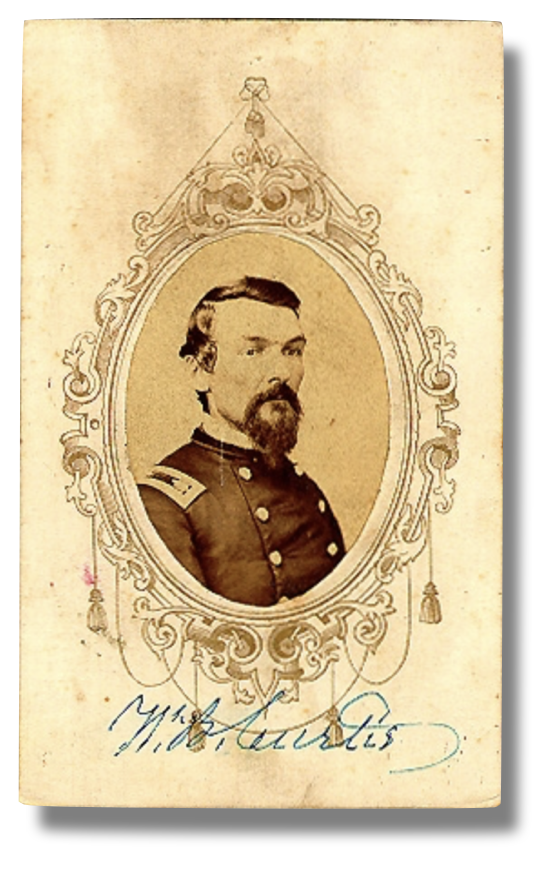
It is near mail time and I would like to get this in the mail. I have wanted to hear from the boys and I knew I would never get your reply so I thought I would write; so you will please write soon.
This is a very nice place—or has been once. All the fences have been burnt and that makes things look very desolate. The health of our company is good and they are in good spirits—most too good. Just now they are all talking and laughing and making a noise that bothers me not a little. I had a letter from home yesterday. They are all well.
I must close for this time. When you answer, I will perhaps write you a longer one. No more, but remember your cousin, —Dave
Address:
D. M. Craig
Company D, 12th Va. Infantry
Winchester, Virginia
Care of Capt. [William B.] Curtis
Letter 2
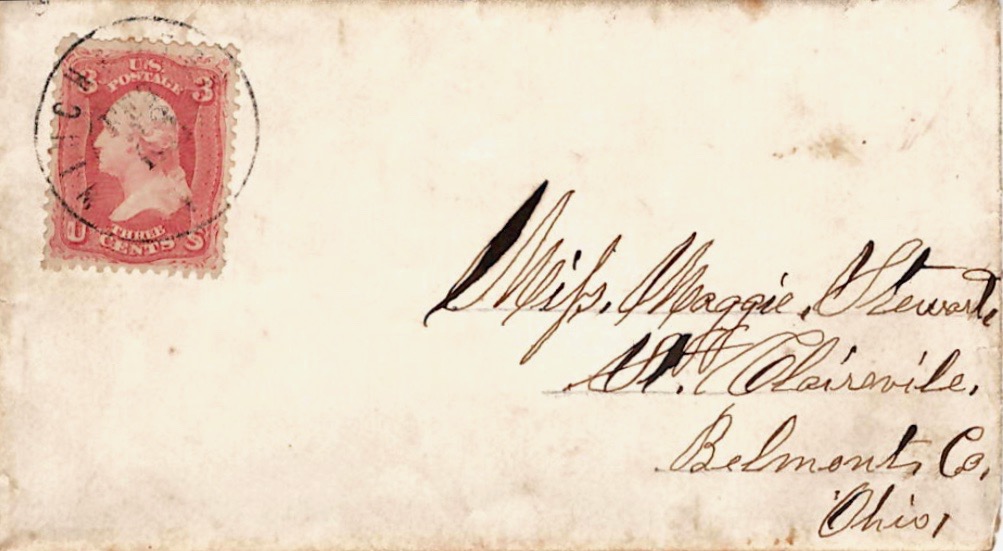
Winchester, Frederick county, Virginia
February 21st 1863
Dear Cousin Maggie,
I received yours of the 18th just this evening and now I attempt an answer. I have just finished my day’s work. I with two others are cooking this week. I don’t like it much but it has to be done. The weather is very changeable. Today it was clear and warm. Tonight it is cloudy and blowing cold—has the appearance of snow. Since I came here, it has been raining one day, snowing the next, clear the next, which makes disagreeable times.
Notwithstanding all this, our company has tolerable good health. There is but two very sick. One of them I think past recovery. I have got quite well again. We have been out six months the 19th. In this time, five of our company have died—two from my mess. It appears as if disease destroys more than the sword.
Our company has been in a small engagement. None were hurt of our fellows. We have seen some very rough times but it is no more than I expected. No one can be a soldier until he sees hard times and the hardest kind of times. I suppose Rob & Joe has seen these kind of times—especially Joe. I would like to see them. If Joe is at Annapolis, he is only 128 miles from here by railroad and about 60 or 70 by land. There was some boys of Co. K of the first [West] Virginia cavalry with whom I was acquainted was taken [prisoner] here about a month ago. They were taken to Richmond and paroled [and] sent to Annapolis. They tried to get home [but] could not get a leave of absence so they started for home. [They] walked 300 miles in 15 days, arriving in Washington, Pennsylvania, the 15th day. They lived in the neighborhood of Triadelphia [Ohio County, W. Va.]. If I was Joe, I would try this plan. They could not do anything with him. He would have to flank all the pickets. It would be a big undertaking for him but I think if I was him, I would try it.
You say that you think the war is not near over. I thought for a while it would be over by the 1st of April, but now I have changed my notion. I think it will last another year [but] hope I may be mistaken.
About 100 rods from where we are now camped is—or was—the house of the rebel [former U. S. Senator James M.] Mason. 1 All that now is left is a pile of rubbish & stones. The boys have thrown it down, took the bricks to pave the front of our tents, and the boards to floor them with. This made the secesh very mad. They say we will pay for it for Jackson will be along by the 1st of March. It is reported that there is 10,000 rebs within 20 miles of us. How true it is about the number, I cannot tell. Our cavalry was out and drove in their pickets. I expect we will have a fight somewhere not far from here soon.
I had a letter from [my sister] Louie [Lucinda] day before yesterday. They were all well. You are like Lou about going anyplace; she told me that [she] could not enjoy herself anyplace like she used to do.
My sheet is about out and I must close for this time. Please answer soon. Give me all the news from you. Cousin Dave
1 During the occupation of Winchester by Brig. Gen. Robert H. Milroy in 1863, “the stately home of former U.S. Senator James M. Mason—a Confederate diplomat—was dismantled brick by brick. Milroy served notice to Winchester’s Rebel women that they were in for a hard time. ‘Hell is not full enough,’ he said. ‘There must be more of these Secession women of Winchester to fill it up.’” [See History Net] Another account states that Mason’s home was destroyed using pick axes. “The entire roof was removed, some time later the walls were pulled over, and anything burnable was chopped into firewood. They did their work so thoroughly that ‘from turret to foundation stone, not one stone remains upon another; the negro houses, the out-buildings [there was an ice house], the fences are all gone, and even the trees are many of them girdled.’ Stone from the foundation was used to build Star Fort, nearby. As Mason wrote later, it was ‘destroyed, or rather obliterated.’ Mason never lived in Winchester again.” [See Burning of Winchester Medical College]
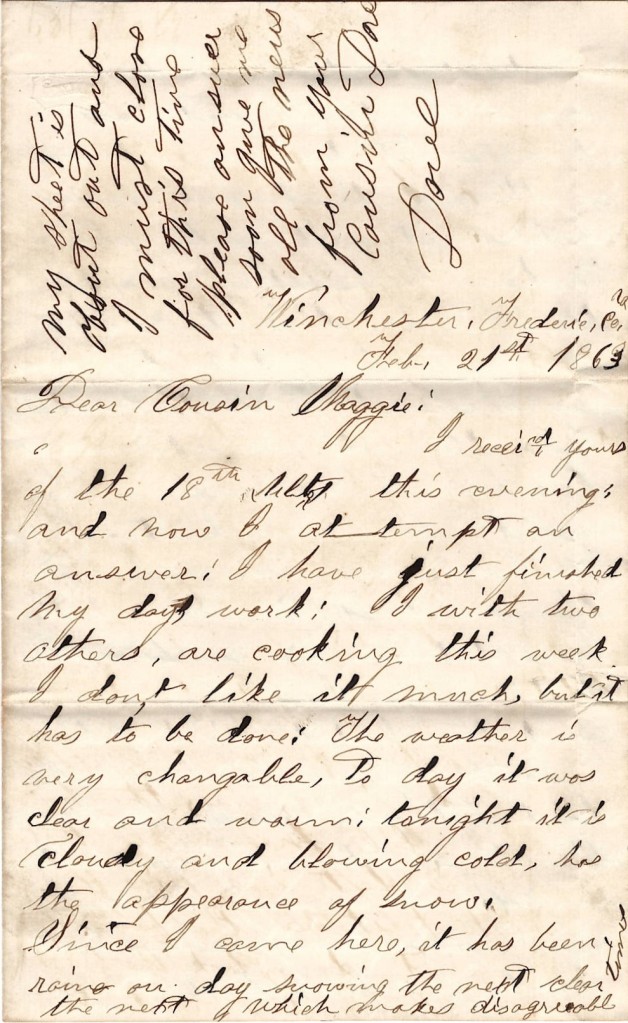
EPSON MFP image 
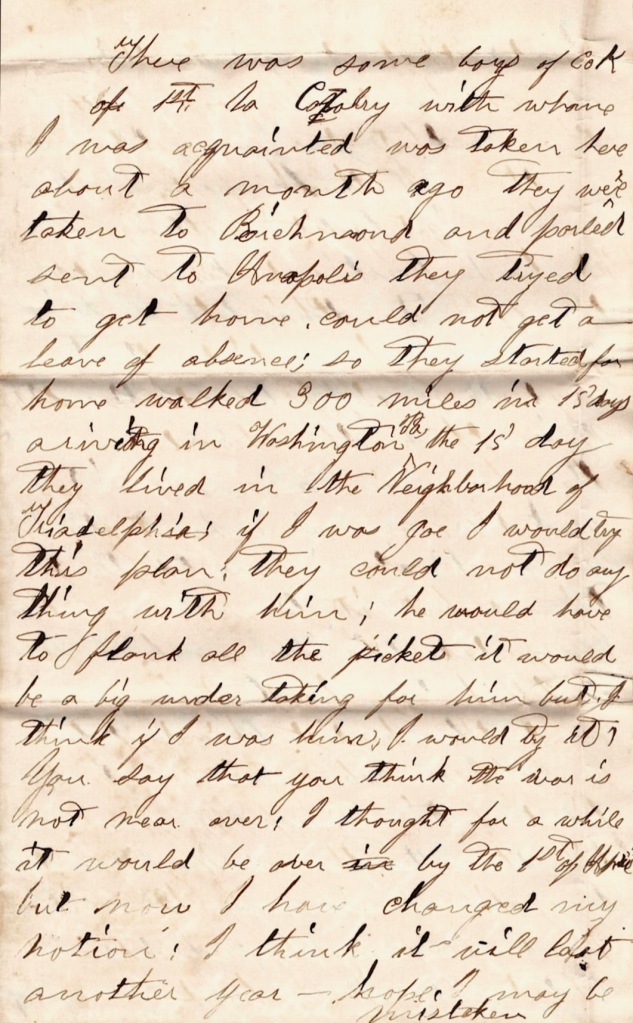

Letter 3

Berryville, Clark county, Virginia
April 8th 1863
Dear Cousin Maggie,
It was on yesterday evening that I was seated on a rude seat in my quarters thinking of the past and think[ing] of what might be in the future when one of the boys came in with a letter from you for me. My gloomy thoughts vanished immediately and I proceeded to read it. I had no trouble to read it as you expected. I have been feeling bad for several days—have had a bad cold. It appears as if I cannot get clear of it. Was afraid I was going to have some kind of fever. Three of our company have the remittent fever, but I guess I will get better now. It is very bad weather for the health now. One day it will snow, the next rain, then get warm, and then cold, so you may have an idea how it would go to stand out among so many changes.
I am glad [to] hear that you enjoyed yourself so well over in West Virginia. As you spoke the different places you went, I could see every crook and turn in the road—especially the hill below our house. I did not think that hill any worse than the hill below your house—that hill we come up the night I was at your house—but perhaps it is. Since I left home, I found I have never seen hills or rough country before.
You will see before you read this far that we have left Winchester. We left last Friday week ago (the 27th). We are only 10 & a half miles from Winchester on the Harper’s Ferry Pike. I do not know what the idea was for bringing us here but suppose it was to keep the rebs from coming up in these parts. There is a few cavalry who live by plundering around here [but] they do not come up here anymore now.
The country around here is very nice [but] the town is the ugliest place I ever seen. It’s the county seat of Clark County. It contains a courthouse and a jail and this is about all. The people around here are in a destitute condition. One of the citizens told me the other day that they had no salt nor sugar, nor coffee—nothing but bread and meat; the latter being scarce. I suppose they have rye & wheat coffee. They have lots [of] wheat here. I see by almost every paper that the South is in a bad fix for something to eat. I suppose it is true. Most of our boys think that the war will be over by the 4th of July. I do not know what to think about it. How it can last long is more than I can see. Yet I fear there is many bloody battles to be fought before it will be ended. I almost get discouraged when I think how things are managed. And just to think of the butternuts at home who are praying that we may get whipped. Sometimes I think I would like to be back at home awhile to whip a lot of them.
I had a letter from uncle Dave Craig last week. He wrote very encouragingly. He said that he hoped “to see the end of this war soon” [and] also that us soldiers had “great reason to believe that we soon would be relieved from our present situation.”
I had a letter from Jane Patterson last week. She was wondering why you did not write to her. I have not heard from home for three or four days. They were well then. I must close hoping to hear from you soon. Excuse bad writing and errors. From your cousin, — Dave.
D. M. Craig
Company D, 12 WVI
Berryville Clark. Va
Letter 4

Clarksburg, Harrison county, W. Virginia
May 20th 1863
Cousin Maggie,
I received your letter day before yesterday. Was glad to hear from you once more [and] to hear that you are all well, which is one of the greatest blessings we enjoy. Your letter found me in good health. The health of our regiment is very good at present.
You will be surprised perhaps to hear that we are back where we started 8 months ago. I can hardly realize the fact myself—but it is so. After marching and counter-marching over the mountains, we have turned up in Clarksburg. We bade farewell to the Valley on the morning of the 9th [and] started for Harpers Ferry where we land[ed] at 8 o’clock on Sabbath morning. We passed through Charlestown—the place where John Brown got his trial and execution. It was dark so I was not favored with seeing the exact spot where he was executed [but] saw the court house where he got his trial. Our boys made a great noise shouting for Brown [and] groaning for [Va. Gov.] Wise & [Jeff] Davis, &c. &c. which made the night hideous to the rebs.
We got aboard cars at one o’clock PM (Sabbath) bound for this place where we arrived at 3 o’clock next day. We turned over our tents to Uncle Sam at Harpers Ferry. Here we have to do the best we can—make board shanties and booths with our gum blankets. I do not know how long we will stay here. I expect not long. Would not be surprised if we go back to the Valley [as] we have nothing to do here. Things are quiet once more. They had quite an excitement here but the rebs did not do much damage. It frightened the people before they felt to secure. Some of the outlaws in our neighborhood have been taken up and are going to be put through.
I do not know what the think of Hooker’s doings [at Falmouth]. I see he has put Stonewall Jackson out of the way. I do not think there will be much more done this summer—it is now so hot in the South. I would like very well to see it close but I fear it is to be a long struggle.
Since I last wrote you, another of our number has died. This makes 7 in 9 months. [His] disease was something like consumption. Oh! how many lives must be laid down before this [war] closes. It makes me feel sad to think it—yet it must needs be I suppose.
We have very pleasant weather here. It is not quite so warm here as down at Berryville. I do not see how the boys stand it in the far South. I fear I have not interested you much. Have not much news to write you. Excuse bad hand writing and mistakes. Please answer soon. My respects to you all. I close. You have the best wishes of your cousin, — Dave
Letter 5
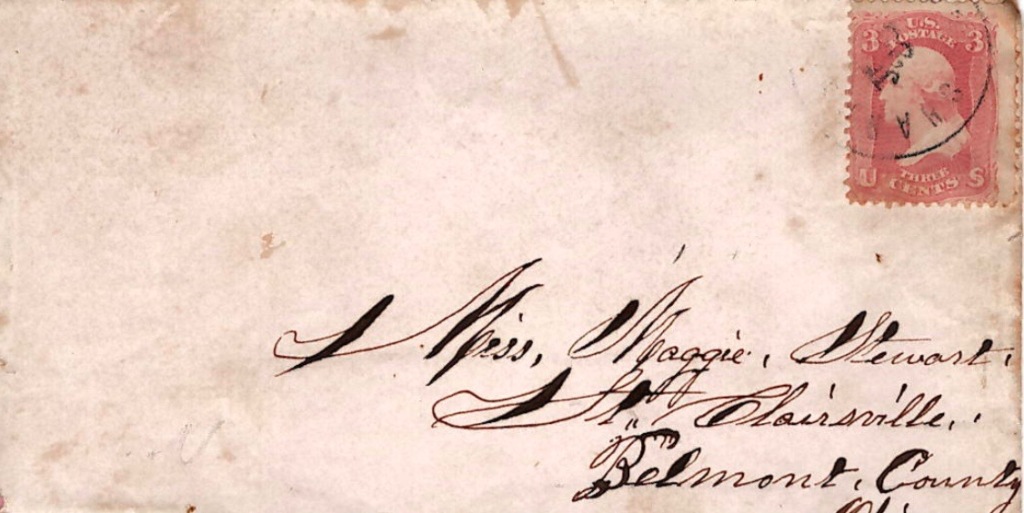
Sharpsburg, Maryland
July 25th 1863
Dear Cousin Maggie,
I take my pen this morning to converse with you for a short time although I would much rather talk face to face. There has been a long silence in our correspondence but I hope you will excuse me when I tell how it is—or was. I received your last letter in due time, but two days after I got it, we was drawn up in line of battle. This was Saturday, 13th of June. We got [into] our position and about 10 o’clock P. M., the advance threw skirmishers out. Skirmished until three when the engagement became general. It lasted about two hours when we were overpowered and had to fall back one half mile where we skirmished until dark.
We slept on the ground [and] it poured and rained most of the night. The contest was renewed Sabbath morning about 8 o’clock [and] continued until four in the evening when they opened on us with about 27 pieces of artillery. This was rather a hot place. We all fell back to the forts and our siege guns opened on theirs. Our place was in the rifle pits under the forts.
Nothing was heard until dark but the crash of artillery. The earth trembled. Strange as it may seem, out of 70,000 men that was engaged about the fort, but three was wounded and they not seriously. In this 9 hours fight, we lost out of our company six wounded on Saturday and the forepart of Sunday. Our regt lost about six killed and about 25 wounded. Our loss altogether was about 300 killed and wounded. We lost the most in captures.
On Sabbath eve, General Milroy got word that he could not be reinforced [so] he started to retreat on Monday morn at 1 o’clock. [We] came about four miles when we ran into an ambush of 10,000. Here was a most terrible fight of about 2 hours. Many was captured. There was 10 of our company taken prisoners. At last we got through their lines and struck for the mountains and came into Pennsylvania. We were tired and starved. I got nothing of any account [to eat] for three days and a half.
In this time, I got lost from the regiment. Got the word that our regiment was going to Wheeling to recruit having lost all our company books, papers, and many their guns [and] all their clothing except what they had on their backs. We thought the story plausible, so I and two others of our company started across the country for home. After four days travel, making 8 days since we left Winchester, we got home having traveled 250 miles. Our regiment had not come and did not come farther than Bedford, Pennsylvania. We stayed home 13 days and left for the regiment. The regiment had moved from Bedford and we did not get to it for 2 weeks.
From Wheeling we went to Pittsburg, then Harrisburg, then to Philadelphia, then to Baltimore, then to Harpers Ferry [and] then walked up here, “so you see I have had a smart round of it. If Lee did drive us across the Potomac, he got himself sent back almost as fast as when he sent us over and Meade is still following him. We are now only about 18 miles from the rear of Lee’s Army. I would not be surprised to hear of a fight any day—this is a kind of a rough sketch of what I have been doing in the last 30 days.
I must close for this time hoping to hear from you soon. Excuse errors and write soon to your cousin, — Dave
Address:
D. M. Craig
Company D, 12th Va. Vol. Inf.
Sharpsburg, Washington County, Maryland
Care of Capt Curtis, to follow Regiment.
Letter 6

Martinsburg, Berkeley county, Virginia
August 15, 1863
Dear Cousin,
I received your favor yesterday and this warm morning finds me seated to pen you a scratch in reply. This month has been most excessive hot but notwithstanding all this, we are all blessed with good health for which I feel very thankful. You will see by the above date that we have changed our place of residence. We left Sharpsburg on the 4th of this month, marched to Harpers Ferry, then got aboard the cars and came up here so we have got into the Valley once more. We are only 22 miles from Winchester. Do not know how long we will stay here. I hope we may stay until it gets cooler. There is some rebs in the Valley yet—a lot of cavalry. Would not be surprised if they pay us a visit. We have got the Baltimore & Ohio R. R. open again which makes things very lively. The whistle of the engine is hardly ever out of our ears now.
It was one year yesterday since I enlisted. To look back on the days and months that have passed—it seems like a long while, but never has a year passed so quickly to me in my life, and yet the war rages yet. Oh! how thankful we should be for the victories that have followed our armies commencing on the Fourth of July. This will ever be a memorable Fourth in the history of our country. From the East to the Southwest cotton states, the enemy was defeated. All looked like a storm at sea—dark and gloomy, but the storm passed and light, or as it were, rays of the sun peep[ed] out from behind the clouds. I think things look more cheering than they ever have done yet.
I am very anxious to hear from Charleston [S. C.]. The 13th was the day that was set for to commence the grand siege. I hope they may prove victorious. Yesterday was payday with us. The boys are in great glee today. I am sorry to hear of uncle Craig’s going to leave. I am thinking of writing them a letter some of these days but I have right smart to attend to, and it is so warm when I am idle that I do not feel much like writing. I have been looking for a letter from Louie Patterson for a week but I have got none yet.
I will have to close for this time. Hope to hear from you soon. My respects to all the family and yourself. My prayer to God is that this unholy war may soon close and we are all permitted to return to our homes to dwell in peace ever more. From your cousin, — Dave



